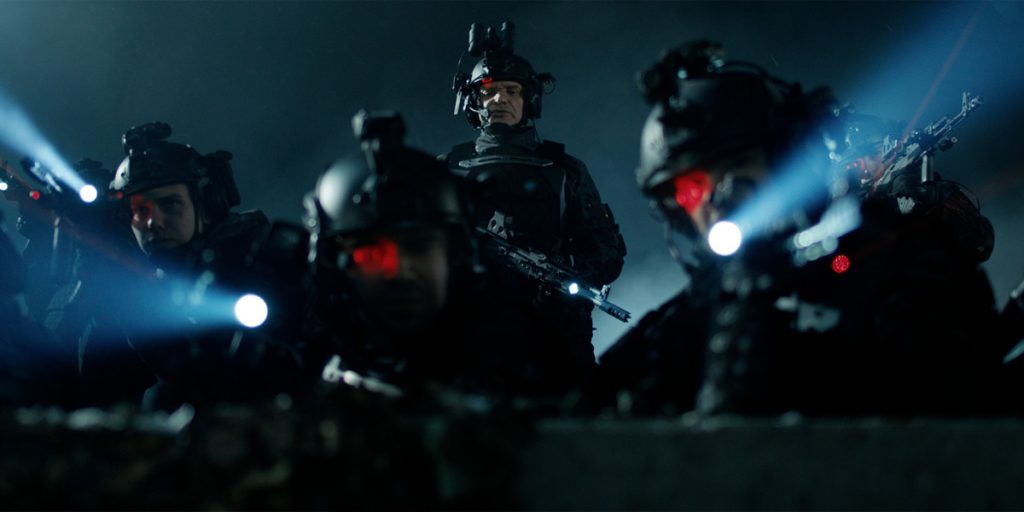Despite effective aesthetics, The Blackout: Invasion Earth ’s issues only become more glaring and problematic against the backdrop of the world in which it exists.
Do you ever see a movie that leaves you unsure of what to make of it? Like, there were definitely elements in there that you really enjoyed, but there was just something about the film that prevented you from hopping aboard the hype-train? This is the conundrum I face when writing about Egor Baranov’s The Blackout: Invasion Earth. There are a lot of things I like about it, and I definitely want to acknowledge where the movie shines, but there is a rather large fly in this movie ointment.
The Blackout: Invasion Earth is a Russian sci-fi/action film where all of the world’s electricity goes out, except for a circle of land in eastern Europe. The film’s narrative follows a group of survivors (mostly soldiers) doing what they can to keep themselves alive and salvage what remains of the world outside of the “the circle of life.”
Let’s start with the positives, because there are plenty of those: The Blackout: Invasion Earth feels like a homage to a lot of classic science fiction films of the late 20th century. In its soundtrack, set pieces, and general theming, there are clear nods to movies like Blade Runner, Invasion of the Body Snatchers, and The Matrix. Hell, they even reference Predator by name in the actual movie. The homages are implemented in a way that doesn’t feel too pandering (with maybe the exception of the Predator shout out), and instead work to give the film its own identity.
I was also pleasantly surprised by the quality of The Blackout: Invasion Earth’s visuals. The movie had a budget of a little over $4 million USD, and, considering the film’s scope and ambition, I wasn’t expecting anything exceptional. But lo and behold, the CGI is mostly solid, accompanied by a creative implementation of prosthetics and makeup. The cinematography also does a lot with shifting focus and perspective which, while not necessarily groundbreaking, are effective and make for a good-looking film. The plotting and pacing are a little uneven, but they ultimately work, and a lot of questions you may have from the first half of the film do get answered by the end. There’s a solid twist near the middle, and, while I won’t give away what it is, it recontextualizes the film’s first half, and creates a new thesis statement for the rest of the film to follow.
Unfortunately, the plot is not without some issues. First, there’s really no one you could call a “main character.” While that’s not an inherently bad thing, The Blackout: Invasion Earth really could have benefitted from having a focal point. According to Wikipedia, a famously reliable source, it was originally developed to be a series, but I guess that idea was dropped because there are a few characters and plot points thrown in there without much explanation, making you feel like maybe they would have been fleshed out more given the time to grow in a series. Not to mention the ending drags: the film reaches a perfectly good stopping point and then just… keeps going. Frankly, I think a solid thirty minutes could have been shaved off.
If that were all there was to talk about, I could probably give The Blackout: Invasion Earth a rating of “turn your brain off and enjoy the explosions” and call it a day. But there is a particularly large elephant in the room. You see, dear reader, The Blackout: Invasion Earth is told from the perspective of the military, so the lens through which the film is presented is quite sympathetic to armed forces and structures of authority. Now, just because something in a movie doesn’t match my own personal beliefs and ideals does not mean that it’s bad or not worth watching. But in this particular case, due to current world events, the events in the film come across as tone deaf and tasteless. You see, there’s a strong alien invasion element to the plot, and all of the people outside of the “circle of life” are controlled by aliens. There are multiple scenes where mass groups of people, including protesters, clash with the military. Because these scenes are portrayed as life and death situations, the military gun down thousands of civilians over the film’s runtime. But the film is presented from the military’s perspective, so the act of killing thousands of civilians is framed as a noble and necessary thing to do.
I viewed The Blackout: Invasion Earth this year. In 2020. The same year of mass protests in my home country, when millions of people marched in protest of the militarization of the police and said police’s killings of unarmed civilians. Do you see now why portraying the mass slaughter of civilians as a good thing comes across as tasteless? I’m certain the movie did not mean to come across this way: the filming apparently wrapped in May of 2019, long before the protests began. But given the context of what’s been happening in the world, The Blackout: Invasion Earth has already aged like milk left out in the sun. There are certainly good things about The Blackout: Invasion Earth, but I can’t in good conscience recommend it.
The Blackout: Invasion Earth was released by 4Digital on 28th December on Blu-Ray, DVD and digital platforms.

